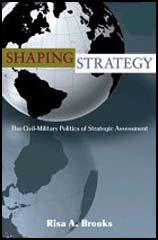Spartacus Review
Volume 18: 12th May, 2008
Military History

Title: Shaping Strategy
Author: Risa A. Brooks
Editor:
Publisher: Wiley
Price: £35.00
Bookshop: Amazon
Spartacus Website: Israel
Category:
Good strategic assessment does not guarantee success in international relations, but bad strategic assessment dramatically increases the risk of disastrous failure. The most glaring example of this reality is playing out in Iraq today. But what explains why states and their leaders are sometimes so good at strategic assessment - and why they are sometimes so bad at it? Part of the explanation has to do with a state's civil-military relations. In "Shaping Strategy", Risa Brooks develops a novel theory of how states' civil-military relations affect strategic assessment during international conflicts. And her conclusions have broad practical importance: to anticipate when states are prone to strategic failure abroad, we must look at how civil-military relations affect the analysis of those strategies at home.Drawing insights from both international relations and comparative politics, "Shaping Strategy" shows that good strategic assessment depends on civil-military relations that encourage an easy exchange of information and a rigorous analysis of a state's own relative capabilities and strategic environment. Among the diverse case studies the book illuminates, Brooks explains why strategic assessment in Egypt was so poor under Gamal Abdel Nasser prior to the 1967 Arab-Israeli war and why it improved under Anwar Sadat. The book also offers a new perspective on the devastating failure of U.S. planning for the second Iraq war. Brooks argues that this failure, far from being unique, is an example of an assessment pathology to which states commonly succumb.

Title: Israel & Palestine
Author: Bernard Wasserstein
Editor:
Publisher: Profile
Price: £8.99
Bookshop: Amazon
Spartacus Website: Israel
Category:
In this new edition of the classic work on the historical and contemporary realities of the Israeli-Palestinian conflict, Bernard Wasserstein challenges the conventional view of the struggle as driven primarily by irrational, nationalist and religious ideologies. Instead he focuses on hitherto relatively neglected dimensions – population, land, labour and the social dynamics of political change. He maintains that Israelis and Palestinians live today in 'Siamese twin societies'. However much they may wish to, neither side can escape the impinging presence and influence of the other. He argues that demographic, economic and social imperatives are driving the two sides willy-nilly towards some form of symbiosis and accommodation.
